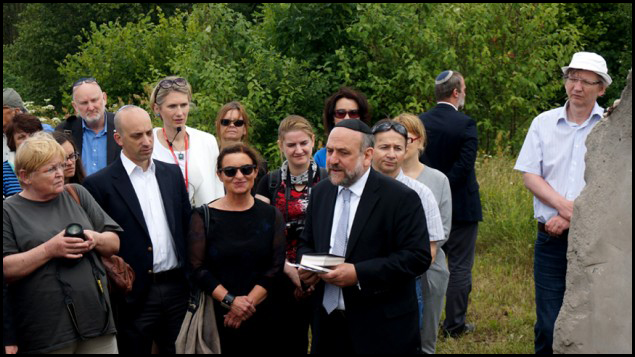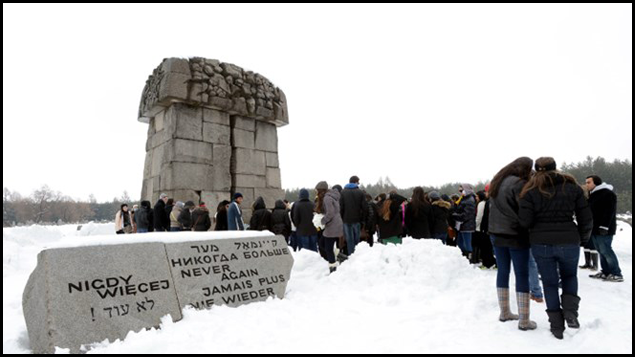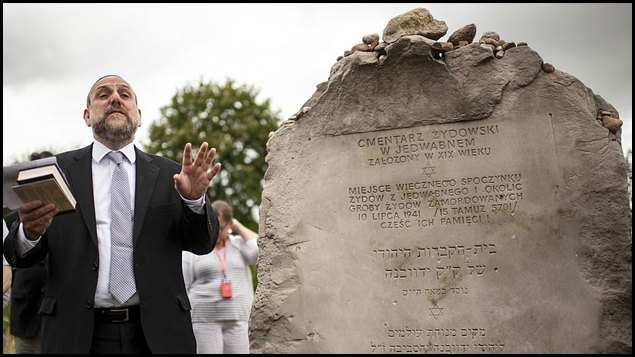Jews
Jedwabne mayor calls for exhumation of Jewish mass grave
JTA — The mayor of a Polish town where locals killed and buried hundreds of Jews added his voice to a growing chorus of officials seeking to exhume the bodies from a mass grave to see if German soldiers were the killers.
Michael Chajewski, the mayor of the town in northeastern Poland, told Gazeta Wyborcza late last week that he supports exhumation. His backing of exhumation comes amid an uproar over a noncommittal statement by Poland’s education minister on television saying that even though state historians and leaders have blamed locals for the pogrom on July 10, 1941, she did not know who killed the Jews of Jedwabne 75 years ago.
“Yes. I’m going to do it,” Chajewski is quoted as telling the paper when asked if he would sign a petition calling for the exhumation. “You need to determine how many people were killed and by whom to finally dispel doubt.”
Poland’s state-owned Institute of National Remembrance determined several dozen locals killed at least 340 Jews at Jedwabne, some of whom they burned inside a barn. The incident, one of at least 20 pogroms against Jews by Poles during or immediately after the Holocaust, was largely unknown in Poland prior to the 2001 publication of a book by historian Jan Gross.
But the institute “said that at the crime scene, dozens of bullets were found. It’s not all that clear,” Chajewski said. Revisionist historians say the bullets mean German troops were likely responsible for the killing because Poles were prohibited from carrying guns in July 1941, when the German army was already present – though not fully controlling – the area. But dozens of testimonies by witnesses and survivors speak of the killing as done by willing locals.
The historical record on Jedwabne is highly controversial because many Poles perceive their nation, where Nazis murdered 3 million non-Jewish Poles in addition to 3 million Jewish ones, as a victim of Nazi genocide. The Jedwabne discovery forced many to readjust this perception to include also some acts by local perpetrators.
Some forensic excavation was already carried out at Jedwabne in 2001 until it was stopped for fear it violated Jewish religious laws on disturbing graves unnecessarily. But calls to exhume the bodies have intensified since the election last year of Poland’s right-wing president, Andrzej Duda.
Duda acknowledged the role of Poles in killing Jews earlier this month. But last year he attacked his predecessor for apologizing in 2011 for Jedwabne and denied that such events actually occurred.
“We did not, as we are falsely accused by others, participate in the Holocaust,” Duda said in a 2015 televised debate. “Lord knows that Poles didn’t take part in the Holocaust.”
The Jedwabne petition, which is being circulated by Ewa Kurek, a far-right historian from Lublin, received coverage in Polish media amid other articles about revisionist tendencies on Jedwabne, including at the Institute of National Remembrance.
Piotr Gontarczyk, a deputy director at the institute, said last week that “it is difficult to pursue a debate on the topic without a complete exhumation.”
Marek Chrzanowski, a historian with the institute who is running for its presidency, said Monday: “I also believe that you must reconfigure the exhumation and get to the truth because this case harms the image of Poles.”
Queried by JTA, an institute spokeswoman said her organization does not support exhumation as a matter of policy, though some of its historians may take a different view.
75 years after pogrom, Poland wrestles with complicity
Polish politicians and academics wrestle with legacy of complicity in Holocaust atrocities exemplified in story of Jedwabne pogrom.
JTA – As German army troops invaded eastern Poland, Ichak Lewin’s family fled their town of Wizna.
On July 10, 1941, the Lewins approached the nearby town of Jedwabne, where hundred of Jews lived and had the means to shelter other Jews. But the Lewins soon realized they had come to the wrong place.
“We were on the cart when we smelled a fire and another bad smell,” said Lewin, recalling the day 75 years ago that has changed how millions in Poland and beyond think of the Holocaust years in that country.
Lewin was 10 when Jedwabne residents massacred hundreds of their Jewish neighbors, including three of Lewin’s uncles and most of his classmates. The townspeople, led by their mayor, rounded up at least 340 Jews and burned them alive inside a barn.
“When the smell reached us, so did word from non-Jewish passersby that the people of Jedwabne burned the Jews,” Lewin said.
Known to few people in post-communist Poland prior to the 2001 publication of a book about it, the Jedwabne massacre was one of about 20 anti-Semitic atrocities perpetrated by Poles during or immediately after the Holocaust. It prompted the country’s previous president, Bronislaw Komorowski, to “beg forgiveness” for the actions of “perpetrators among the nation of victims,” as he said in 2011.
But in a country where anti-Russian sentiment is fueling a nationalist revival, historians, politicians and activists are engaged in a campaign to discredit the inconvenient accounts from Jedwabne and those who exposed them.
Lewin, who survived the war because he was rescued by Polish villagers, recalled the massacre at Jedwabne on Sunday while speaking to some 150 visitors who attended a low-key ceremony commemorating its 75th anniversary.
None of the villagers participated in the memorial event, which the mayor could not attend due to a previous engagement.
Sobbing, Lewin addressed his remarks in Yiddish to a photograph of his classmates, including one of his cousins, who were burned alive.
“I made a life for myself in Israel, but know that I think of you all the time,” he said at the ceremony, which was attended by Anti-Defamation League CEO Jonathan Greenblatt and Poland’s undersecretary of state, Wojciech Kolarski.
Kolarski, who chose not to speak at the event, told JTA that the Poles who killed Jews “damaged an ancient tradition” of coexistence in Poland. Poland’s right-wing president, Andrzej Duda, conveyed a similar message when he spoke earlier this month at the site of another pogrom, committed in 1946, against Jews in the town of Kielce.
But before Duda was elected president last year, he attacked his predecessor for apologizing in 2011 for Jedwabne and denied that such events actually occurred.
“We did not, as we are falsely of accused by others, participate in the Holocaust,” Duda said in a 2015 televised debate. “Lord knows that Poles didn’t take part in the Holocaust.”
He has since changed his tune, at least publicly.
At Kielce, vowing to reject anti-Semitism, Duda said: “Also ordinary people were involved in the attack. I leave it down to historians and sociologists to determine how it happened and why it happened, why people reacted in this particular way.”
A senior state historian this week offered one answer to the questions raised by Duda: He blamed Jews of brutality against non-Jews before the 1941 German invasion, when the part of Poland that included Jedwabne was controlled by Russia.
“Poles took part in the crime” at Jedwabne, but pro-communist sympathies by Jews and “hateful acts perpetrated by Jews” stoked hate against Jews, Piotr Gontarczyk, a deputy director at the Institute of National Remembrance, said in an interview that Radio Poland published on the 75th anniversary.
The 2001 book “Neighbors” by the Princeton University historian Jan Gross, which exposed the Jedwabne massacre, has statistics and accounts that “don’t add up,” Gontarczyk said. Gross, he added, “is no historian.”
Gross, the Norman B. Tomlinson ’16 and ’48 professor of war and society and a history professor at Princeton, migrated to the United States from Poland in 1969.
Two “criminal ideologies are responsible for the events in Jedwabne,” Gontarczyk said in the interview: communism and Nazism. To determine what happened at Jedwabne, the bodies must be exhumed, he added – a scenario many Jews oppose on religious grounds.
Revisionist statements among officials such as Gontarczyk are a new development, according to Efraim Zuroff, the Israel director of the Simon Wiesenthal Center.
“Progress was made under previous governments toward confronting the Jedwabne massacre, which is emblematic of other pogroms by Poles against Jews,” Zuroff said. “The current right-wing government wants to turn back the page and rewrite it as it used to be.”
But he said historical documentation exists not only about Jedwabne – where witnesses said one Jewish girl was raped and decapitated by people who playfully kicked around her severed head – but also about 20 other cases of mass murder of Jews by Poles during or shortly after the Holocaust.
At least 1,500 and possibly 2,500 people died in the pogroms, Polish Chief Rabbi Michael Schudrich said.
One of the incidents occurred a month after the Jedwabne killings in the nearby village of Bzury, where Polish prosecutors in 2013 said 20 Jewish women were raped and then butchered by locals. In another massacre in Wasosz, axe-wielding villagers hacked and buried hundreds of their Jewish neighbors.
For Poland’s Law and Justice party, Zuroff said, fully acknowledging these events “puts at stake their whole national identify because it changes the perception of Poland as a victim nation.”
Non-Jewish Poles certainly suffered in the war. The Nazis killed 3 million non-Jewish Poles in addition to 3 million Jewish ones and, as “lesser humans” under the Nazi racial code, Poles were not invited to collaborate in the same way as Hungarians, Romanians and the people of Baltic nations.
And like the people of other countries controlled by Russia during communism, Poles also suffered oppression and atrocities directed from Moscow – a trauma that has left widespread anger toward Russia and is helping the right wing garner votes in reaction to President Vladimir Putin’s current expansionist politics.
For Duda’s right-wing government especially, the discussion about Jedwabne clearly touched a nerve.
In recent months, Polish authorities began pursuing a criminal investigation of Gross, who exposed the massacre. Police questioned him in April for allegedly violating Poland’s law against “insulting the Polish nation” because he said in an interview recently that more Jews than Germans died at the hands of Poles during World War II.
In February, Duda’s office ordered an examination of the possibility of withdrawing a state honor given to Gross.
In parallel, the Polish government has led efforts to highlight the actions of 6,600 Poles who saved Jews, including by opening a museum in their honor this year and erecting three monuments for them in Warsaw alone. Poland has the highest number of saviors in absolute terms, though other countries have a higher proportion of non-Jews who saved Jews.
While Polish saviors deserve recognition, Gross said, in the current atmosphere there is a fear that “it’s an attempt to create an alternative narrative, to distract,” he told JTA.
If that is true, the effort is not going very well. Last year, the Jedwabne debate was rekindled following the publication of an English translation of a book written in 2004 in Polish by historian Anna Bikont that puts the Jedwabne death toll at double the 340 estimated by state historians. It also alleges that locals shot Jews trying to escape.
“I was saved by Poles to whom I owe my life,” Lewin said at the Jedwabne monument, a black stone whose center features a charred barn door. “But on July 10,” he said of that infamous day in 1941, “we were safer with the Germans.”
Mayor of Jedwabne and locals skip Holocaust Memorial
Local Poles skip ceremony to mark Holocaust-era Jewish massacre. Townspeople, mayor of Jedwabne do not attend memorial for hundreds of Jews slaughtered by their countrymen in 1941.
JEDWABNE, Poland (JTA) — Some 150 people attended a commemoration on the 75th anniversary of a massacre of hundreds of Polish Jews by their neighbors in the country’s northeast. Absent, however, were the non-Jewish residents of Jedwabne.
Jonathan Greenblatt, the CEO of the Anti-Defamation League, also attended Sunday’s ceremony in the town of Jedwabne, whose history is controversial in Poland because it involves complicity in the Holocaust by members of a nation that many locals perceive primarily as a victim of the Nazi occupation.
Commemorating the victims in Jedwabne “grounds our work, which is to fight anti-Semitism, bigotry and racism,” Greenblatt said.
At Jedwabne, a few dozen perpetrators burned alive at least 340 Jews in July 1941.
The mayor of Jedwabne did not attend the event, citing previous engagements. Nor did any of the townspeople, according to Henryk Zandek, 90, a non-Jewish man who lived in Jedwabne for years after World War II.
Ichak Lewin, an 85-year-old survivor who lives in Israel, sobbed when he recalled how the entire Jewish population of his village near Jedwabne was “taken to the barn and burned alive,” he said. Warned by locals, his family escaped the roundup in nearby woods, where a Polish family hid them. Lewin said he later worked in a German army kitchen.
Under Poland’s Communist governments, which blurred sectarian divides and at times displayed anti-Semitic tendencies, Jedwabne’s Holocaust-era record was little known until 15 years ago, Poland’s chief rabbi, Michael Schudrich, told JTA at the event.
In 2001, the publication of a book on Jedwabne by Princeton historian Jan Gross triggered a public debate on the issue.
In a nation where the Nazis killed 3 million non-Jewish Poles in addition to 3 million Jewish ones, “some found it, and some find it, difficult to accept the very bitter truth” about Jedwabne, Schudrich said. But since then, polls suggest that today approximately half of Poles have come to accept their compatriots’ role in the massacre, Schudrich said.
Polish Undersecretary of State Wojciech Kolarski represented Polish President Andrzej Duda at the event, where he laid a wreath at the monument for the victims.
“To be clear about what happened here: Polish citizens killed their own Polish compatriots of Jewish origin in a way that damaged a long tradition of living side-by-side,” Kolarski told JTA. “There can be no justification for that.”
At least 1,500 Jews died at the hands of Poles during the Holocaust or immediately after it, Schudrich said.
Some Polish politicians in the past denied that Poles killed Jews in Jedwabne, including former senator Jadwiga Stolarska, who in 2001 stated in Parliament that Germans were behind the killings and that “there was no way a Pole could kill a Jew.”
In 2011, Poland’s then-president, Bronislaw Komorowski, said of the centrist Civic Platform: “I beg forgiveness” for what happened at Jedwabne. In a nation of victims, he said, “there were perpetrators.”
Duda, the current president of the center-right Law and Justice party, last year attacked Komorowski’s statement in what some observers considered a step backward from acceptance of the role of Poles in the massacre at Jedwabne.
“I believe it is extremely important for us that we did not, as we are falsely accused by others, participate in the Holocaust,” Duda said at a televised debate last year. “The Lord knows that the Polish people did not take part in the Holocaust.”
Jonny Daniels, founder of the From the Depths commemoration group, said the event “shows us how seriously Polish society takes this matter,” citing Kolarski’s presence and that of the national media. Unlike some of its neighbors, he said, Poland is “standing up to its sometimes difficult past and not shirking from often painful truths.”
Times of Israel staff contributed to this report.


